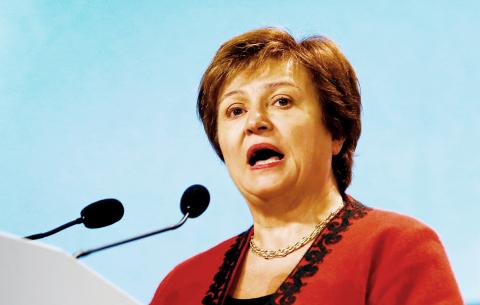The World Bank would give equal weight to curbing emissions and helping poor countries deal with the “disastrous effects” of a warming world as it steps up investments to tackle climate change in the first half of the 2020s, it said yesterday.
The bank and its two sister organizations plan to double their investments in climate action to about US$200 billion from 2021 to 2025, with a boost in support for efforts to adapt to higher temperatures, wilder weather and rising seas.
The latest figures on climate funding for developing countries show barely a quarter has been going to adaptation, with the bulk backing clean energy and more efficient energy use.

Photo: Reuters
“We must fight the causes, but also adapt to the consequences that are often most dramatic for the world’s poorest people,” World Bank chief executive Kristalina Georgieva said, as leaders flagged rising needs at UN climate talks in Poland.
Of the US$100 billion the World Bank plans to make available in the five years from mid-2020, half would go to adaptation measures, it said.
Those include building more robust homes, schools and infrastructure, preparing farmers for climate shifts, managing water wisely and protecting people’s incomes through social safety nets, Georgieva said.
The World Bank said the money would also improve forecasts, and provide early warning and climate information services for 250 million people in 30 developing countries.
“Climate change is an existential threat to the world’s poorest and most vulnerable. These new targets demonstrate how seriously we are taking this issue,” World Bank Group president Jim Yong Kim said in a statement.
The bank spent nearly US$21 billion from 2014 to this year on adaptation, which accounted for just over 40 percent of the climate benefits generated by its funding overall.
Former UN secretary-general Ban Ki-moon said the World Bank’s pledge to use half its climate finance to find solutions to deal with changing weather patterns was “important.”
“Climate change is already having a disastrous impact on people right around the world and we are nearing the point of no return,” Ban said. “So we must take bold action to adapt to the reality of the threat facing us all.”
The remaining US$100 billion in promised World Bank Group funding is to come from the International Finance Corp, which works with the private sector, and the Multilateral Investment Guarantee Agency, as well as private capital the group raises.

TRAGEDY STRIKES TAIPEI: The suspect died after falling off a building after he threw smoke grenades into Taipei Main Station and went on a killing spree in Zhongshan A 27-year-old suspect allegedly threw smoke grenades in Taipei Main Station and then proceeded to Zhongshan MRT Station in a random killing spree that resulted in the death of the suspect and two other civilians, and seven injured, including one in critical condition, as of press time last night. The suspect, identified as a man surnamed Chang Wen (張文), allegedly began the attack at Taipei Main Station, the Taipei Fire Department said, adding that it received a report at 5:24pm that smoke grenades had been thrown in the station. One man in his 50s was rushed to hospital after a cardiac arrest

SAFETY FIRST: Double the number of police were deployed at the Taipei Marathon, while other cities released plans to bolster public event safety Authorities across Taiwan have stepped up security measures ahead of Christmas and New Year events, following a knife and smoke bomb attack in Taipei on Friday that left four people dead and 11 injured. In a bid to prevent potential copycat incidents, police deployments have been expanded for large gatherings, transport hubs, and other crowded public spaces, according to official statements from police and city authorities. Taipei Mayor Chiang Wan-an (蔣萬安) said the city has “comprehensively raised security readiness” in crowded areas, increased police deployments with armed officers, and intensified patrols during weekends and nighttime hours. For large-scale events, security checkpoints and explosives

PUBLIC SAFETY: The premier said that security would be tightened in transport hubs, while President Lai commended the public for their bravery The government is to deploy more police, including rapid response units, in crowded public areas to ensure a swift response to any threats, President William Lai (賴清德) said yesterday after a knife attack killed three people and injured 11 in Taipei the previous day. Lai made the remarks following a briefing by the National Police Agency on the progress of the investigation, saying that the attack underscored the importance of cooperation in public security between the central and local governments. The attack unfolded in the early evening on Friday around Taipei Main Station’s M7 exit and later near the Taipei MRT’s Zhongshan

ON ALERT: Taiwan’s partners would issue warnings if China attempted to use Interpol to target Taiwanese, and the global body has mechanisms to prevent it, an official said China has stationed two to four people specializing in Taiwan affairs at its embassies in several democratic countries to monitor and harass Taiwanese, actions that the host nations would not tolerate, National Security Bureau (NSB) Director-General Tsai Ming-yen (蔡明彥) said yesterday. Tsai made the comments at a meeting of the legislature’s Foreign Affairs and National Defense Committee, which asked him and Minister of National Defense Wellington Koo (顧立雄) to report on potential conflicts in the Taiwan Strait and military preparedness. Democratic Progressive Party (DPP) Legislator Michelle Lin (林楚茵) expressed concern that Beijing has posted personnel from China’s Taiwan Affairs Office to its